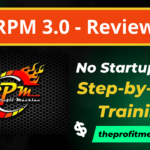Blogging is an exciting and creative way to share your ideas, connect with like-minded individuals, and potentially turn your passion into a profitable venture. If you’re a beginner eager to embark on your blogging journey, this guide will help you get started on the right track with five essential steps.
Proven Way to Make Money Online – Watch this FREE Video to START >>

1. Find Your Passion and Niche:
The foundation of a successful blog is your passion. Begin by identifying your interests, hobbies, or areas of expertise. Your blog’s niche should revolve around these passions. Consider what topics genuinely excite you, as blogging is a long-term commitment that requires dedication. It’s also essential to select a niche that has an audience; research to ensure there’s a demand for the content you plan to create.
2. Choose a Domain Name and Hosting:
Your domain name is your blog’s unique web address, and reliable hosting is the place where your blog’s files and content are stored. Select a domain name that is relevant to your niche, easy to remember, and not too long. Many hosting providers offer user-friendly platforms like WordPress, making it simple for beginners to set up and manage their blogs. Consider factors like hosting costs, support, and scalability when choosing a hosting provider.
3. Create Quality Content:
Content is king in the blogging world. To attract and retain readers, your content must be informative, engaging, and well-crafted. Develop a content strategy and an editorial calendar to plan your posts. Research your topics thoroughly, offer a unique perspective, and provide valuable information to your readers. Use a clear and accessible writing style, and include visuals like images, infographics, and videos to enhance your content.
4. Connect and Engage with Your Audience:
Building a successful blog is not just about publishing content; it’s also about building a community. Engage with your readers by responding to comments, encouraging discussions, and being accessible. Promote your blog through social media, email newsletters, and other promotional channels. Connect with other bloggers in your niche by leaving thoughtful comments on their blogs and participating in relevant online forums or communities.
5. Monetize Your Blog:
While you may start your blog as a passion project, it’s possible to generate income from it. Several monetization options are available, such as affiliate marketing, sponsored posts, selling digital products or courses, and displaying ads. Choose monetization strategies that align with your niche and cater to your audience’s preferences. Keep in mind that monetization usually takes time and a substantial readership, so focus on providing value to your audience first.
Proven Way to Make Money Online – Watch this FREE Video to START >>
1. Find Your Passion and Niche:
When it comes to starting a successful blog, finding your passion and niche is the fundamental building block. In this guide for beginners, we’ll explore the significance of passion and niche selection and how they set the stage for your blogging journey.
1. Passion Fuels Your Blog:
Your passion is the driving force behind your blog. It’s what keeps you motivated, even when challenges arise. Choose a niche that genuinely interests you and aligns with your passions. Whether it’s travel, food, fashion, or technology, your enthusiasm will shine through in your writing and captivate your audience.
2. Understanding the Concept of a Niche:
A niche is a focused and specialized topic within a broader category. It’s crucial for defining your blog’s scope and target audience. For instance, if your passion is fitness, your niche might be “bodyweight workouts for busy professionals” or “vegan meal prep for athletes.” Niching down allows you to cater to a specific audience with unique needs and interests.
3. The Power of Audience Engagement:
Blogging isn’t just about writing; it’s about building a community. Your passion and niche are magnets that attract like-minded individuals. Engaging with readers who share your interests strengthens your blog’s connection with its audience. Respond to comments, encourage discussions, and create a sense of community.
4. Establishing Authority:
Becoming an authority in your niche is easier when you’re passionate about the subject matter. Your enthusiasm drives you to research and become knowledgeable in your chosen area. As your expertise grows, so does your credibility among readers, leading to increased trust and engagement.
5. Differentiating Your Blog:
Passion and niche selection allow you to stand out in the blogosphere. When your blog is a labor of love, it shows in the quality and uniqueness of your content. Your blog becomes a reflection of your personality and perspective, making it distinct from others in your niche.
6. Consistency and Longevity:
Passion ensures that you remain committed to your blog over the long term. Consistency in posting and a genuine love for your niche are essential for building a dedicated readership and achieving long-term success.
7. Monetization Opportunities:
Once your blog gains traction, you’ll have various opportunities to monetize your passion. Affiliate marketing, sponsored posts, and selling your own products or services become viable income sources as your audience grows.
Finding your passion and niche is the crucial first step on your journey to becoming a successful blogger. Your passion fuels your motivation, engages your audience, and helps you stand out in your niche. As you delve into your chosen topic, remember that the key to blogging success is staying true to your passion and delivering content that resonates with your dedicated readers. Your blogging journey begins with your heart’s interests and a focused niche; the rest is built on your commitment and dedication.
Proven Way to Make Money Online – Watch this FREE Video to START >>
2. Choose a Domain Name and Hosting:
Selecting the right domain name and hosting service is a critical step in launching your blog. In this guide for beginners, we’ll explore the importance of these choices and provide insights to help you make informed decisions.
1. The Domain Name: Your Digital Identity:
– Your domain name is your blog’s digital identity. It’s the web address that visitors will type into their browsers to access your blog. When choosing a domain name, keep these tips in mind:
– Relevance to Your Niche: Select a domain name that reflects your blog’s content and niche. For instance, if your blog is about travel, consider including keywords related to travel in your domain name.
– Memorability: A short, memorable domain name is ideal. Avoid complex, lengthy names that can be challenging for users to recall.
– Uniqueness: Make sure your domain name is unique and not easily confused with existing websites. Check for trademark issues and ensure it’s available for registration.
2. The Role of Hosting: Where Your Blog Lives:
– Web hosting is the service that stores your blog’s files and makes them accessible on the internet. When selecting hosting, consider these factors:
– Reliability: Choose a hosting provider known for reliability and uptime. You want your blog to be accessible to visitors at all times.
– Support: Reliable customer support is invaluable, especially for beginners. Look for a hosting provider with responsive customer service to assist you with any technical issues.
– Scalability: As your blog grows, so will your hosting needs. Ensure your hosting plan can accommodate increased traffic and additional features.
– Pricing: Hosting costs can vary widely. Compare hosting providers to find a plan that aligns with your budget and requirements.
3. Combining Domain and Hosting:
– Many hosting providers offer domain registration as part of their services. This option simplifies the process as you can manage both your domain and hosting from a single dashboard. Consider this convenience when choosing your hosting provider.
4. DIY or Managed Hosting:
– Decide whether you want to manage hosting yourself (DIY) or opt for a managed hosting service. DIY hosting provides more control and flexibility but requires technical expertise. Managed hosting, on the other hand, offers convenience and support, making it an excellent choice for beginners.
5. Protecting Your Domain:
– Consider purchasing domain privacy protection. This service shields your personal information from being publicly accessible in the domain registration database, enhancing your online privacy and security.
6. Reliable Backups:
– Ensure that your hosting provider offers regular backups. This feature can save you from data loss in case of unexpected issues, such as server crashes or data corruption.
Choosing the right domain name and hosting service is like laying a strong foundation for your blog. Your domain name is your online identity, so pick one that is relevant, memorable, and unique. Selecting the right hosting provider is equally important, as it affects your blog’s accessibility, support, scalability, and costs. Whether you opt for a DIY approach or managed hosting, remember that the right choices can set you on the path to blogging success. Start your blogging journey with a solid foundation, and you’ll be well-prepared for the adventures ahead.
Proven Way to Make Money Online – Watch this FREE Video to START >>
3. Create Quality Content:
Creating high-quality content is the backbone of a successful blog. In this guide for beginners, we’ll delve into the elements that make content valuable, engaging, and appealing to your readers.
1. Understand Your Audience:
Before you start creating content, get to know your target audience. What are their interests, needs, and pain points? Understanding your audience enables you to tailor your content to provide real value to them.
2. Choose Compelling Topics:
Select topics that resonate with your niche and audience. Your topics should be relevant, interesting, and preferably solve a problem or answer a question your readers have. Use tools like keyword research to identify trending and in-demand topics.
3. Write Engaging Headlines:
Your headline is the first thing readers see, so make it compelling. Use action words, numbers, and intriguing questions to pique curiosity. A well-crafted headline can entice readers to click and explore your content.
4. Provide In-Depth Information:
High-quality content goes beyond the surface. Provide in-depth information, detailed explanations, and valuable insights. Use research, examples, and data to back up your claims and make your content trustworthy.
5. Maintain Readability:
Keep your content easy to read and understand. Use clear and concise language. Break up long paragraphs with subheadings, bullet points, and lists. Organize your content logically so that readers can follow the flow.
6. Visual Appeal:
Incorporate visuals like images, infographics, and videos to break up text and make your content visually appealing. Visual elements enhance understanding and engagement.
7. Proofread and Edit:
Grammatical errors and typos can detract from the quality of your content. Always proofread and edit your work before publishing. Consider using editing tools or seeking help from a second set of eyes.
8. Use a Unique Voice:
Develop a unique and consistent writing style that reflects your personality and brand. A distinct voice sets your content apart and makes it more relatable to your audience.
9. Encourage Interaction:
Engage with your readers by encouraging comments, questions, and discussions. Respond to comments promptly and build a sense of community around your blog.
10. SEO Optimization:
Incorporate basic search engine optimization (SEO) practices. Use relevant keywords, optimize meta tags, and ensure your content is discoverable by search engines. This can help attract organic traffic to your blog.
11. Consistent Posting Schedule:
Maintain a regular posting schedule. Consistency keeps your audience engaged and aware of when to expect new content. It also aids in building a dedicated readership.
Proven Way to Make Money Online – Watch this FREE Video to START >>
4. Connect and Engage with Your Audience:
Connecting and engaging with your audience is a vital component of a successful blog. In this guide for beginners, we’ll explore how to foster meaningful connections and create an interactive and vibrant blog community.
1. Encourage Comments and Interaction:
– Encourage your readers to leave comments and interact with your content. Respond to comments promptly and thoughtfully. Acknowledging your readers’ opinions and questions fosters a sense of community and shows that you value their input.
2. Implement Social Sharing:
– Make it easy for readers to share your content on social media. Include social sharing buttons on your blog posts, allowing your audience to spread the word about your content and attract new readers.
3. Email Newsletter Engagement:
– If you have an email newsletter, engage with your subscribers regularly. Send informative and engaging newsletters, exclusive content, and updates about your blog. Use email as a channel for deeper connections.
4. Polls and Surveys:
– Conduct polls and surveys to gather feedback and opinions from your audience. This not only helps you understand their preferences but also involves them in shaping your blog’s direction.
5. Host Q&A Sessions:
– Host live or pre-scheduled Q&A sessions where your audience can ask questions and interact with you directly. These sessions provide a more personal connection and allow for real-time engagement.
6. Share Personal Stories:
– Share personal anecdotes and stories related to your blog’s niche. Personal stories create a stronger bond with your readers, as they can relate to your experiences and see the person behind the blog.
7. User-Generated Content:
– Encourage user-generated content by inviting your readers to contribute articles, photos, or stories related to your blog’s niche. This collaborative approach can enhance engagement and provide fresh perspectives.
8. Create a Sense of Community:
– Foster a sense of community by connecting your readers with one another. You can create a forum, Facebook group, or other community platform where they can discuss common interests, share experiences, and ask questions.
9. Participate in Blog Challenges:
– Engage your audience by participating in blog challenges or events. These can be related to your niche or general topics. Challenges provide a fun and interactive way for your readers to get involved.
10. Guest Posts and Collaborations:
– Collaborate with other bloggers or allow guest posts on your blog. Cross-promoting and collaborating with others can introduce your blog to new audiences and expand your community.
11. Analyze and Adapt:
– Regularly analyze your audience’s behavior and feedback. Use data and insights to adapt your content and engagement strategies. Tailor your approach based on what resonates most with your readers.
5. Monetize Your Blog:
Monetizing your blog is an exciting step towards turning your passion into a profitable venture. In this guide for beginners, we’ll explore various strategies and methods to generate income from your blog.
1. Affiliate Marketing:
– Affiliate marketing involves promoting products or services on your blog and earning a commission for each sale made through your unique affiliate links. Choose products or services that align with your niche and resonate with your audience.
2. Sponsored Content:
– Collaborate with brands or companies that are relevant to your blog’s niche. They may pay you to create and publish sponsored posts, reviews, or articles featuring their products or services.
3. Display Advertising:
– Sign up for ad networks like Google AdSense, Media.net, or AdThrive to display advertisements on your blog. You earn revenue based on impressions, clicks, or a combination of both. Optimize ad placement for better results.
4. Sell Digital Products:
– Create and sell digital products such as e-books, online courses, printables, templates, or design assets. Your expertise in your niche can be packaged into valuable digital products for your audience.
5. Offer Services:
– If you possess skills related to your niche, offer services such as consulting, coaching, or freelance work. Your blog can serve as a portfolio to attract clients interested in your services.
6. Membership or Subscription Models:
– Introduce a membership or subscription model for premium content. Subscribers pay a fee to access exclusive articles, resources, or a community forum on your blog.
7. E-commerce and Merchandise:
– Set up an e-commerce store or sell merchandise related to your blog’s niche. This can include physical products, apparel, or branded merchandise that your audience may find appealing.
8. Donations and Crowdfunding:
– Some bloggers rely on their readers’ generosity by accepting donations or using crowdfunding platforms like Patreon or Ko-fi. This method allows your most devoted fans to support your work directly.
9. Partner with Other Bloggers:
– Collaborate with fellow bloggers in your niche on joint projects, courses, or webinars. Sharing revenue from such collaborations can be a mutually beneficial way to monetize your blog.
10. Cross-Promotion:
– Cross-promote other products or services that complement your niche. For instance, if you have a food blog, you could promote cooking equipment or kitchen appliances as an affiliate.
11. Sponsored Reviews:
– Similar to sponsored content, you can write reviews of products or services for a fee. Honest and transparent reviews help your audience while generating income for your blog.
12. Use Multiple Income Streams:
– Diversify your income sources by utilizing multiple monetization strategies. This not only increases your revenue potential but also provides a safety net in case one income stream fluctuates.
Monetizing your blog is a way to leverage your hard work and passion into a source of income. Whether it’s through affiliate marketing, sponsored content, display advertising, or selling digital products, there are numerous ways to generate revenue. The key is to choose strategies that align with your niche and resonate with your audience. Remember that monetization often takes time, so stay patient and focus on providing value to your readers. As your blog grows and your readership expands, your income potential will increase.
Proven Way to Make Money Online – Watch this FREE Video to START >>
Conclusion:
Starting a successful blog as a beginner can be a rewarding experience. By finding your passion, selecting a niche, choosing a domain name and hosting, creating quality content, engaging with your audience, and exploring monetization strategies, you’re on your way to building a blog that resonates with readers and fulfills your goals. Remember that blogging is a journey, and success doesn’t happen overnight. With dedication, consistent effort, and a genuine commitment to your audience, you can turn your blogging dreams into a thriving reality. Happy blogging!











